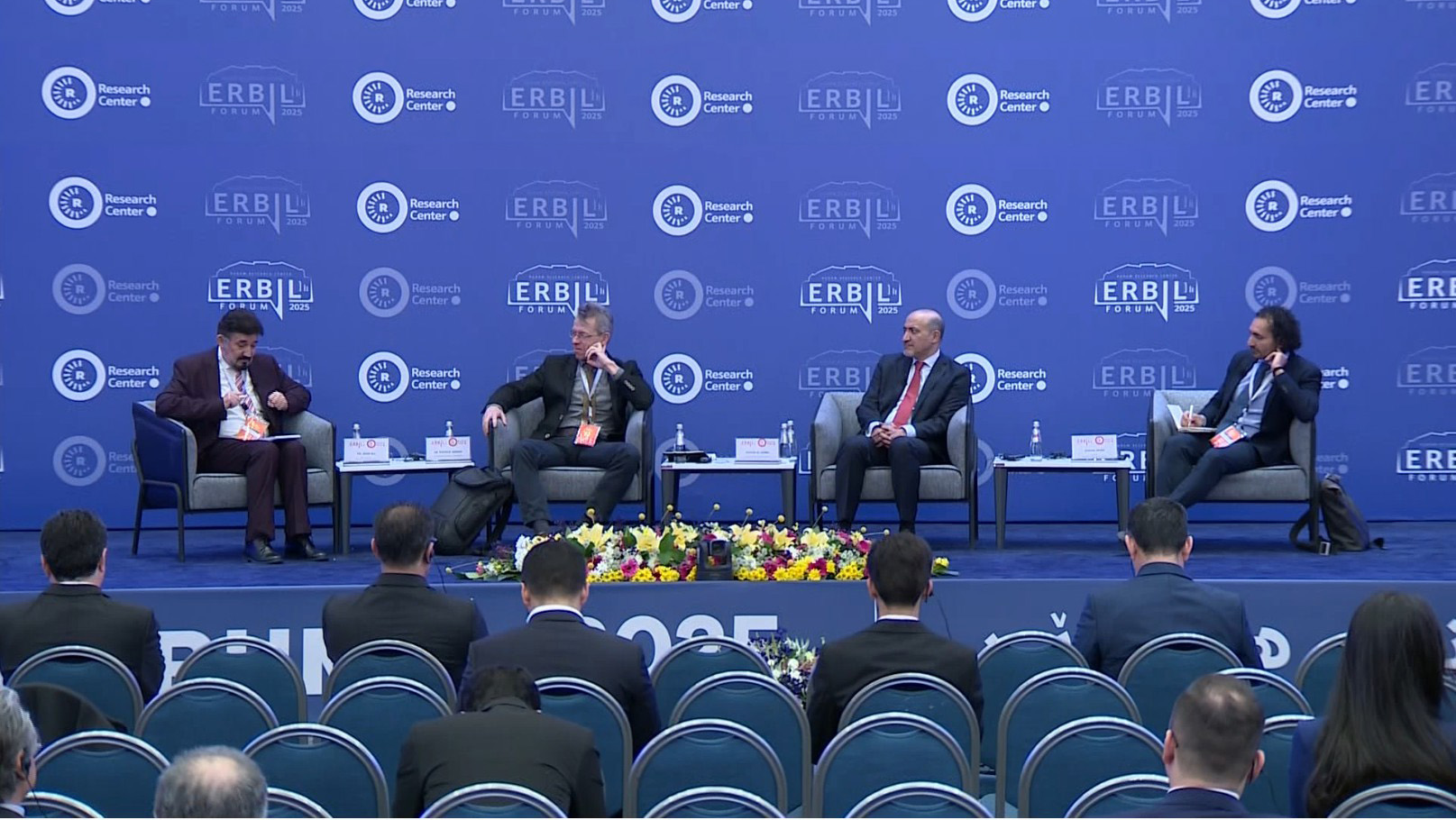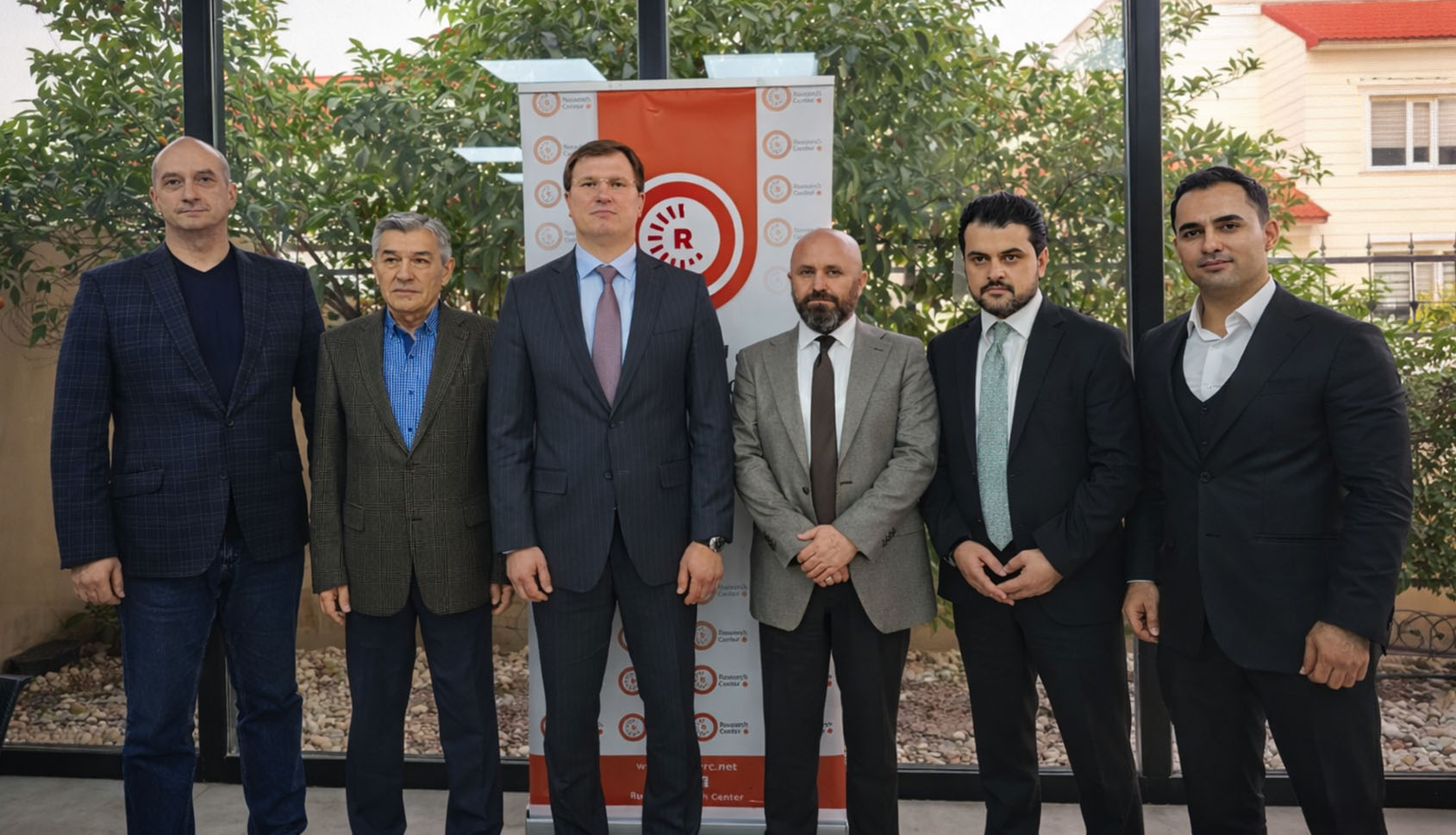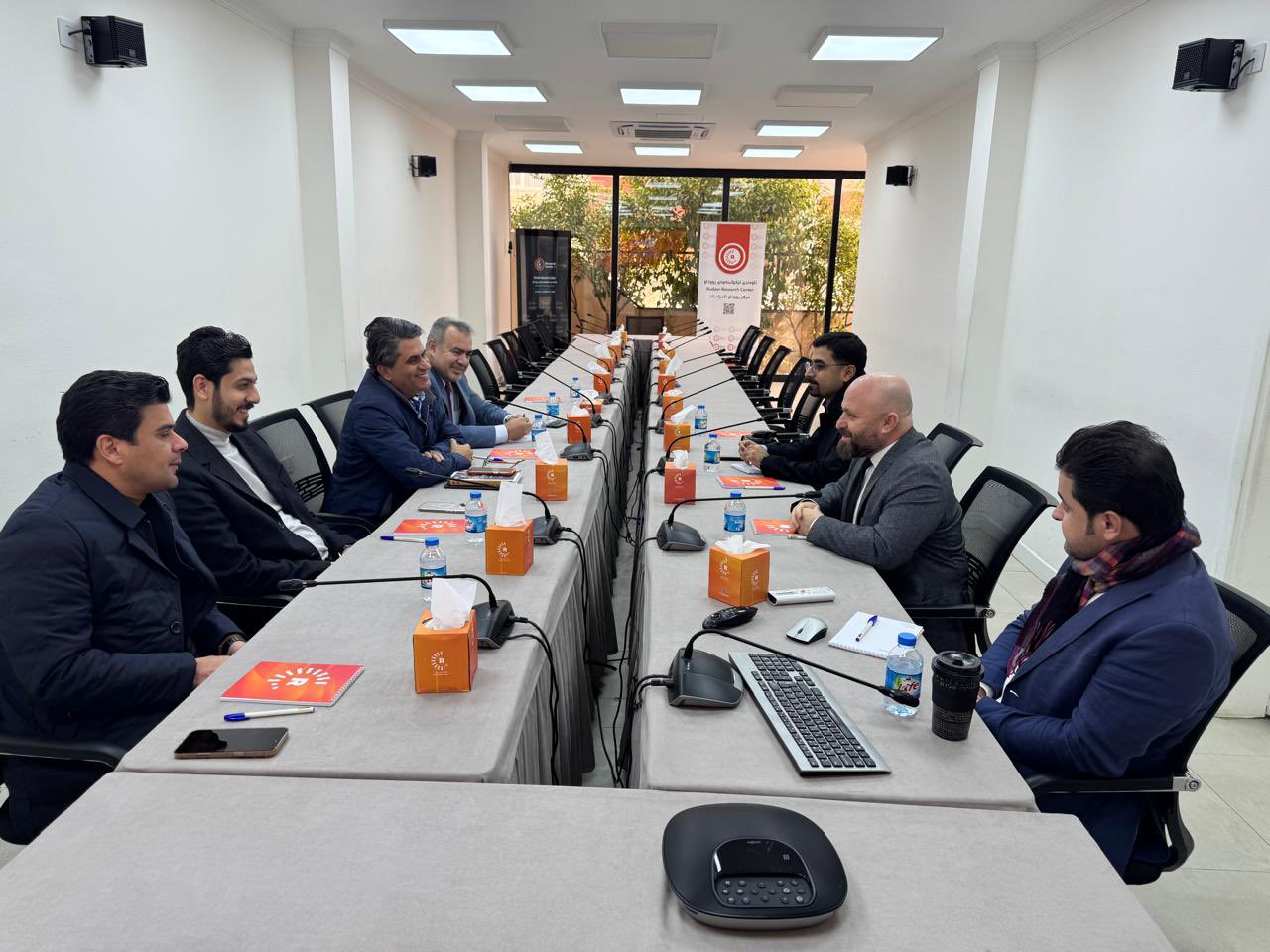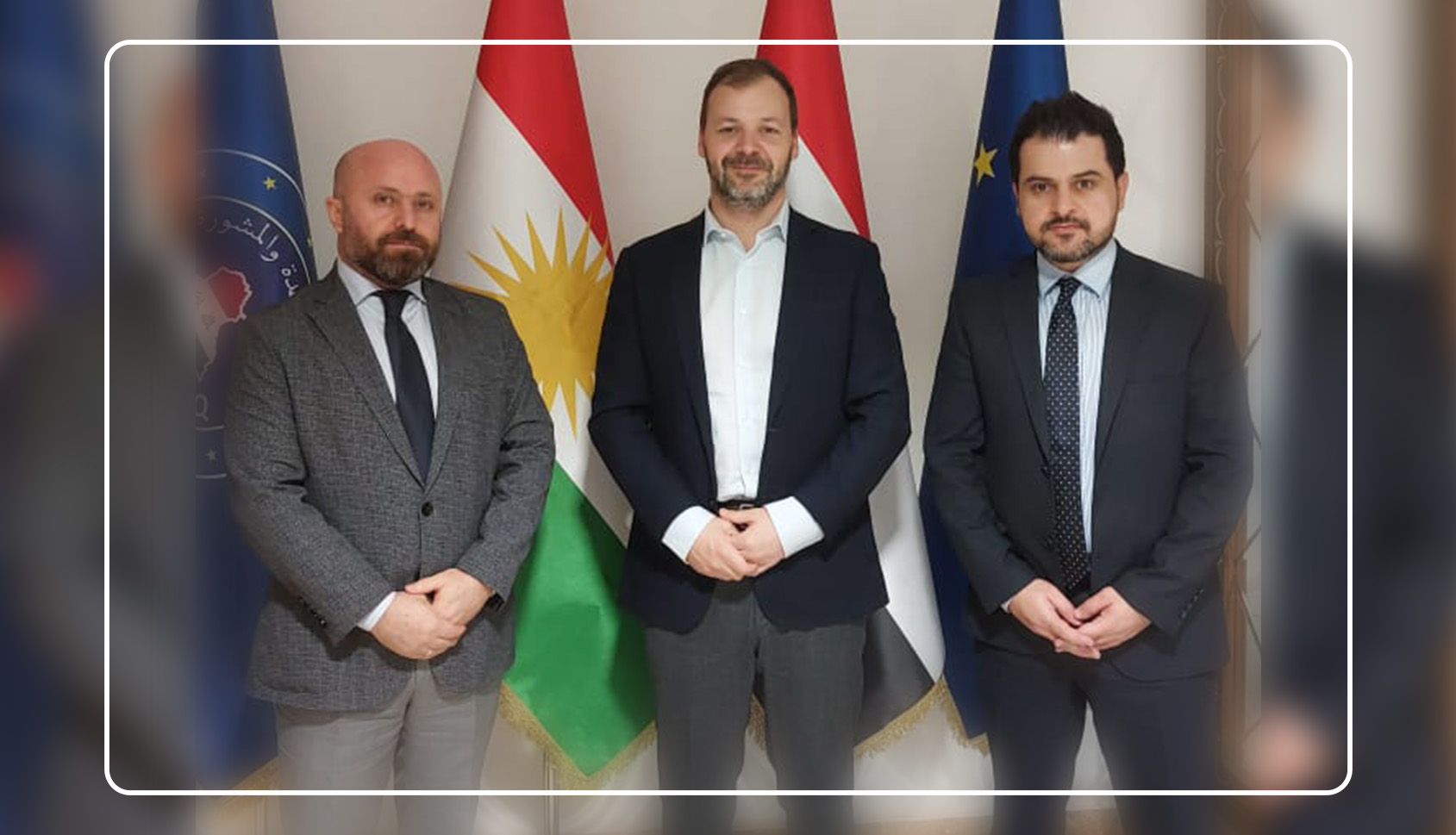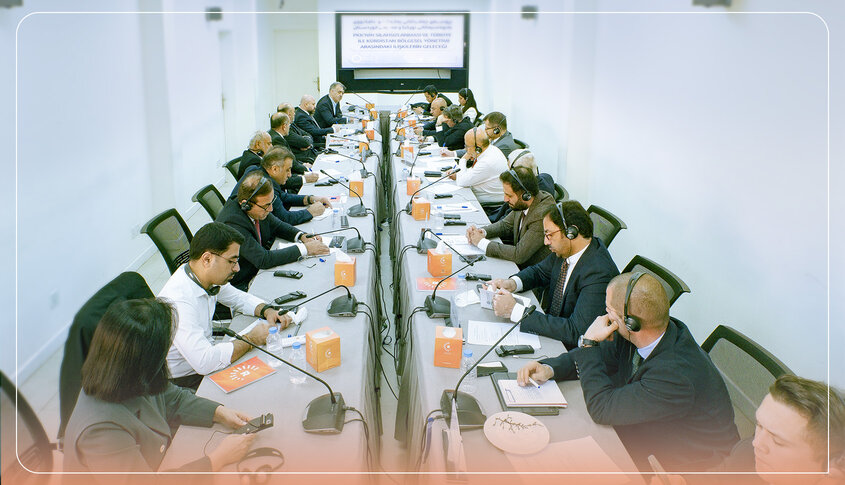Panel 04: Post-Assad Syria: Challenges to State Integration, Power Consolidation, and Political Transition
09-04-2025
Azad Ali: Welcome to today's fourth panel. I would like to extend my gratitude to Mr. Ahmad Al-Jarba, Chairman of the Syria’s Tomorrow Movement and former President of the Syrian Opposition Coalition; Dr. Patrick Haenni from the Humanitarian Dialogue Organization; and Mr. Ahmad Mhidi, Syria Advisor at the Centre for Humanitarian Dialogue, for being here today.
It is often said that, according to sociologists and political scientists, the Syrian conflict in the previous century boiled down to a struggle between military boots and religious turbans. This signifies that Syria has been under military rule for 90 percent of its 90-year history since gaining independence. The rise of dictatorship and authoritarianism led to a reaction from religious movements, resulting in the emergence of political Islam or Islamism. In the current context, political Islam or Islamism has gained ground, and we no longer see a conflict solely between soldiers' boots and religious turbans; rather, military boots and turbans have now merged. In other words, we are facing a new reality where power is increasingly held by jihadist groups who monopolize weapons and enforce Islamic law.
We have been in a complex situation for the past decade, and we are now entering an even more complicated phase. I would like to pose a crucial question to Ahmad Al-Jarba: How do you assess the situation in the months following the potential collapse of the [Assad] regime?
Ahmed Al-Jarba:
It is no secret that Syria has been in a state of revolution and war for the past fourteen years. The country is fragmented and in a dire social, economic, and political situation. Sanctions have been imposed on it. The sudden collapse of the regime caused many countries to reconsider their policies.
Over the past three years, there have been attempts to normalize relations with Bashar al-Assad’s regime. However, the regime unexpectedly collapsed. Of course, after 14 years, such a collapse is inevitable, but politically, regional countries and some of the world’s major powers had begun to normalize relations with the regime and even took steps toward its re-entry into the Arab League. But then, suddenly, it collapsed! I believe Syria is now in a phase of rebirth. There is great joy among the Syrian people with the fall of the dictatorship after more than five decades of father-son rule. There remains strong hope among Syrians that the process of power transition will proceed smoothly.
We may encounter some stumbling blocks along the way, and there may be some resentment as time goes on. The situation is still unclear, but I believe that the full picture will begin to emerge within this year. The situation in Syria is highly complex, yet at the same time, it is quite simple in terms of its social structure and foundation. However, if a dictatorial regime, like the previous one, emphasizes divisions based on tribes, nations, races, and religions, it leads to fragmentation and a lack of trust within the social fabric.
The opposite approach is simple: there should be wise governance and a clear, modern, and inclusive constitution, based on several core principles. The first principle is to avoid dictatorship and authoritarian rule, as this is the shortest path to the country’s collapse. The second principle is to form a national unity government in which all political parties and communities are represented. This government should immediately establish a constitutional committee and a national reconciliation committee.
Azad Ali: Based on your experience with this opposition, this armed group, and the group that gathered and elected Ahmad Sharia as president of Syria, are you optimistic that this group, which you know better than any of us, will move towards good governance and not produce authoritarian leaders like the past?
Ahmad Al-Jarba: That’s a good question.
First, after fifty years of dictatorship and fourteen years of intense war, the Syrians have neither the will nor the enthusiasm to return to arms, defense, and revolution. Now, there is an opportunity to give a chance, but the duration of this opportunity should not be too long—it should be at least one year from today. After fifty years of dictatorship and individual rule, Syria cannot be ruled in the same way as in the past.
We are now in a phase where we need to provide a real opportunity to save the country. If there is genuine intent from the current government and the new administration to ease the participation of all political forces, I believe this could lead to the lifting of sanctions, reconstruction, and state-building. If the opposite happens, in my opinion, we will return to square one, and I hope that Syrians across all communities will seize this opportunity.
Azad Ali: Thank you. Let's go to Dr. Patrick. Dr. Haenni, in recent weeks, there has been talk of Syrian-Syrian dialogue, activities, and meetings centered around the devolution of power to the provinces. Two days ago, around 600 to 900 people gathered at the palace of the defeated Bashar al-Assad in what they called a national dialogue. As an expert, do you think the theoretical, political, and academic concept of dialogue is being applied to what has transpired in Syria in recent weeks?
Dr. Patrick Haenni: Thank you. Your question is important. I believe there are currently three main paths that will determine Syria's future. First, there is a transitional phase that includes several stages of national dialogue. This may involve committees that could lead to constitutional drafting and, eventually, elections in the uncertain future. However, before that, the most crucial issue is the question of control over the arena. The security challenges are enormous, and we are dealing with a new ruling power and administration that has emerged from a history of organizational struggles.
The primary challenge that I think will determine Syria's immediate future is how to stabilize the security situation in various regions. One challenge is related to the management of uncontrolled groups, whose fate remains uncertain. Among these groups are the Alawite community, a large portion of which supported the previous regime. Their fate has been intrinsically linked to state, military, and security institutions for fifty years. What will happen to them? We are talking about hundreds of thousands of people.
This is a vast area that is not yet fully under control, and it carries significant security implications. The political future of these groups and their relationship with the state remain major uncertainties. The state’s official discourse emphasizes that it does not want to adopt a policy of eradication, as was seen in Iraq in 2003. It rejects two approaches: one is a policy of eradication, and the other is a model similar to Lebanon’s, which involves regional or sectarian quotas in some form. However, the policy on the ground remains generally unclear.
There are still uncontrolled areas and large groups within society whose political fate remains uncertain. Therefore, I believe the most important step is to define a clear policy towards these groups. What happened on December 8 was a military victory, of course, and it painted a real political picture. When I say “real,” I do not intend to overvalue the term "revolution," but there is indeed a project to radically change the governance structure. Whether this will result in improvement or deterioration is yet to be seen, but there is a revolutionary project underway, and it will face opposition from counter-revolutionary forces, as we saw at the beginning of the Arab Spring.
At that time, the region was sharply divided between one side that supported the Arab Spring and political Islamic revolutions—led by Turkey and Qatar—and another side that opposed these political changes, including the UAE, Saudi Arabia, Egypt, and Jordan to a lesser extent.
This kind of polarization no longer exists, and in some ways, the states could view Syria’s experience of change with suspicion, especially because it was seen as a political Islamic or jihadist movement. Above all, Saudi Arabia continues to monitor the situation and may try to support this transition in other ways. Now, we are dealing with a revolution without a counter-revolution. But the question remains: will this last? I believe managing sensitive issues, such as the situation in the coastal areas, is very important in order to avoid igniting the scenario of an uprising, which is not an impossible outcome.
The essence of national dialogue lies in the ability of the current administration to include all communities, political forces, regions, and groups, with the exception of those closely aligned with the former regime. If marginalization occurs, I believe we could face even greater challenges ahead.
Azad Ali:
Obviously, Dr. Patrick sees this as a political struggle and a political change, and he has the right to describe it that way. Let me go to Mr. Ahmad Mhidi. Is there a possible connection between the fact that a jihadi organization like ISIS was originally al-Qaeda, then became ISIS, then the al-Nusra Front, followed by HTS, and finally the Operations Directorate and the Syrian presidency? Is there an opportunity for leadership to emerge from these forces that have gone through these stages, to lead the dialogue process and the political process, and to include political communities and movements? To what extent do you believe this is possible and what are your expectations?
Ahmad Mhidi:
First of all, I would like to say that there has been much discussion about the roots of the current leadership under different titles: Salafi, Jihadi, ISIS, etc. Many researchers and writers have written about this. The leadership of the Syrian Liberation Council and the current Syrian leadership have moved beyond jihadist Salafism, and anyone who looks around Damascus and other areas today, even in Idlib, can see these changes. In my opinion, this is not the key factor we should focus on when it comes to conducting dialogue or state-building. One of the main characteristics of the Syrian revolution or conflict is its localization. The Sunni tribal Arab structures used their networks of communication through tribal links to survive the war. These groups were ultimately the ones who won and reached Damascus—whether it was HTS with its presence in Idlib, the National Army groups in the north, or even more broadly, the Sunni Arab groups that once formed the Free Syrian Army and are now part of the Syrian revolution.
If we take the National Dialogue Conference as an example—the mechanism for convening, choosing participants, or the discussions to form the Ministry of Defense—we notice that locality, tribalism, and patriarchal politics played a much greater role than relying on different political or civil society constructs. In my opinion, this is due to the reality of Syria. That is, there has been no strong experience for political parties, civil society, boards, or syndicates inside Syria. It was largely Sunni Arab villagers who created political projects, ran their own areas, and then came to power. This is an activity that cannot be easily detached from its context in order to work in the way that many claim would fit the new criteria for political transition.
Azad Ali: Thank you. Dr. Patrick, I have a question for you. Since the Al-Nusra Front, now known as HTS, has taken control in Syria and the gates of Damascus have been opened to it, do not the thousands of martyrs who fought against ISIS and preserved social peace in the Syrian desert and eastern Syria have the right to govern themselves?
Patrick Haenni: Ultimately, the question comes down to the Syrians themselves.
Azad Ali: No, from your perspective, we have nothing to do with the Syrians right now. We are in a negotiation session.
Patrick Haenni: I tell you, we have to acknowledge that the past 12 years have gone through many stages, fronts, and battlefields. The battlefield against ISIS was a major one and resulted in the local administration project you are referring to, which now covers a large area. This project is militarily strong, with support from the international coalition, including the United States. In other words, this party is one of the current actors in the political arena and the Syrian political equation, and it must be part of the future dialogue in some way.
I also see two possible paths. The first is a short-term approach, which involves an understanding between the Syrian Democratic Forces (SDF) and Damascus on issues such as oil, the situation in the Kurdish areas of Aleppo, and so on. Bigger questions will arise later, including the integration of this project into a broader national initiative. However, I have no suggestion on this matter because, ultimately, it is up to the Syrians to decide. It is important that the national dialogue is inclusive.
The optimistic aspect is that Damascus, or the new administration in Damascus, is not alone. There are countries that support this experience, and I believe that the supporters of this project want a peaceful and stable transition of power, with an emphasis on political participation during the transition. We have heard these recommendations from all the countries involved in Damascus' future, whether they are Arab, Western, or European. We heard similar remarks from the German ambassador in previous panels, and I believe Europe is not alone in emphasizing participation. Arab countries have also stressed the importance of this issue.
Finally, Damascus is not an isolated entity in the region; it is part of this region. Of course, it will interact or shape this project depending on the reactions of the countries in the region.
Azad Ali: Thank you. Ahmad Jarba, I have a question for you. An Ottoman document states that the Shammar tribe, led by your noble family and Fars Jarba in general, formed an alliance with Badr Khan Beg, Emir of Botan, in 1846 in preparation for a revolution against Ottoman rule. It was agreed that the Shammar tribe would bring their cavalry and forces to Rumelan to be near the battlefront. After more than 180 years of this Arab-Kurdish political alliance—the first alliance of contemporary significance—how do you, as the leader of a Syrian party and a prominent figure from this original Arab tribe, defend Kurdish rights in the new Syria?
Ahmad Jarba: Regarding your question, the person who formed an alliance with Badr Khan Beg was my sixth grandfather, Sheikh Safuq, son of Fars.
Azad Ali: That's right, son of Fars.
Ahmad Jarba: They were both opposed to the ruling power, the Ottoman Empire at that time. Sheikh Safuq actually stayed in what is now Iraqi Kurdistan for about two years. This is history. As for the second part of the question, we have viewed the Kurds and the Kurdish community with a special perspective for a long time.
Kurds have faced oppression in most countries for a long period and may continue to do so. We have a deep understanding of Kurdish issues, one that is distinct from others. While others may have begun to recognize these problems over the past ten or twenty years, we have had this understanding for much longer. In principle, we consider the Kurds our brothers, and there is a long history of friendship between us. The former Kurdish tribes stood by us in the wars against the Arabs.
There were times when there were conflicts between two Kurdish tribes. At times, we were aligned with one Kurdish side against another. That is the nature of the relationship. In the current situation in Syria, there is a real opportunity for the Kurds to enter the Syrian national system wisely, without escalating demands. We stand with our Kurdish brothers to achieve our rights and their rights together.
Azad Ali: Thank you. Thank you for your presence, and thank you for listening. Due to time constraints, we will end this session now. Greetings to everyone, and thank you.
Patrick Haenni: Thank you.

